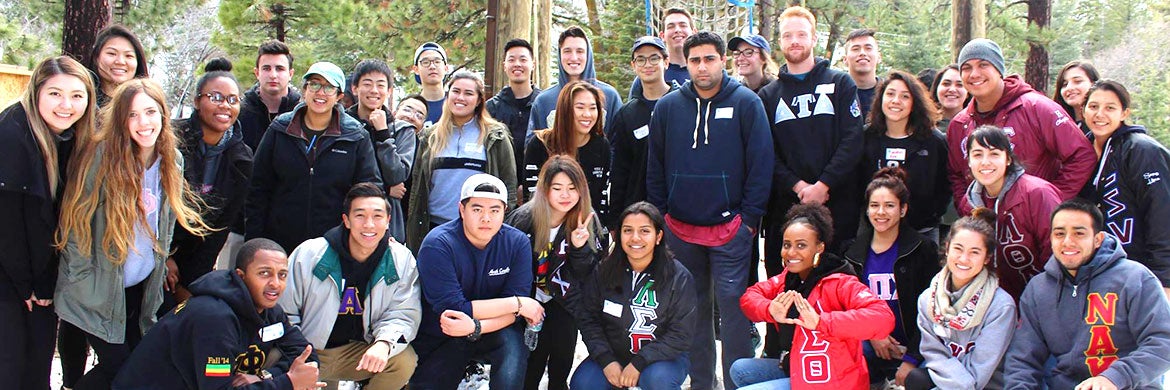Fraternity/Sorority FAQ
Answers to Your Questions
You may have a lot of questions regarding fraternity and sorority life at UCR. It’s no secret that many stereotypes exist about fraternities and sororities, but the students involved in the organizations at UCR have done a lot to break down the stereotypical behavior that is so often seen in the media.
-
What is being in a fraternity or sorority all about?
Coming to college is one of the major life changes that your student will go through. Joining a fraternity or sorority can help make the transition easier. Developing lifelong friendships with the members in their chapter helps make the campus smaller. For many members, these chapters become a home away from home. In addition to the friendship, every chapter promotes the values of enhancing leadership, scholarship, philanthropy/service and financial responsibility in their members. Additionally, national research has shown that involvement in fraternities and sororities increases a student's chances of graduating from college. As a lifelong member of a fraternity or sorority, students are offered the opportunity to develop as leaders, serve the local community and focus on academics, as well as their careers, by connecting with local alumni members of their organizations.
-
Are fraternities and sororities primarily social in nature?
There is a social aspect to the fraternity and sorority community and these “social” events include educational programming/workshops, community service events, intramural sports, scholarship dinners and Homecoming, in addition to events and socials. Today’s fraternity and sorority communities across the nation have adopted a stringent approach to socializing thereby creating a safer, more beneficial learning environment for members. Each chapter is expected follow its own local and national risk management policy in addition to the university’s policies and local, state and federal laws.
-
Will fraternity/sorority membership affect my student's grades?
Academics are a priority in the fraternity/sorority community. When students join, they become part of a larger group of students who value their academic goals. This group understands what the new member is facing and can provide support in many areas. Many chapters enforce minimum grade point average requirements and offer academic support, such as study sessions, tutoring and other workshops to assist members. As long as your student dedicates time to study, attends class regularly and utilizes university academic resources, their academics should not be compromised.
-
How much time does involvement in a fraternity or sorority require?
It all depends on how involved your student chooses to be with their organization. The time commitment varies from chapter to chapter but the first quarter is often the most time intensive as the new member goes through the chapter's education program. The time spent in this program will give students the opportunity to develop their leadership and time management skills, learn about the history of the organization, develop friendships and allow them to become involved with other organizations. After the initiation into the chapter, expectations will vary. Each chapter has weekly chapter meetings and other mandatory events (philanthropies, service and initiation) throughout the year, but they are planned well in advance. With good time management, fraternity/sorority activities will easily fit into students’ schedules and allow plenty of time for classes, studying, work and participation in other campus activities.
-
How much does it cost to be a member of a fraternity or sorority?
Each of UCR’s fraternities and sororities has different amounts of dues associated with membership. Financial obligations are usually shared during the recruitment process for each chapter. Membership dues often go towards national insurance, philanthropic events, social events, and leadership workshops and retreats.
-
What about hazing?
UCR has a zero tolerance for hazing. UCR rigorously enforces this policy, and any chapter that violates this policy will be given due process and, if found responsible, may be subjected to organizational and/or individual sanctions and discipline. It is also important to note that most fraternal organizations have adopted ant-hazing policies and have strict rules in regards to new member processes. If you feel your student is being hazed, please report this to the Fraternity and Sorority Involvement Center (951) 827-2438 or email us at fsic@ucr.edu.
-
My student is considering joining a fraternity/sorority that is not one of UCR's registered organizations. What should I do?
University recognized organizations work closely with the Fraternity and Sorority Involvement Center. They are held accountable to university policies, can reserve space on campus and are able to participate in FSIC sponsored programs and events. Unrecognized fraternities and sororities do not maintain the same privileges and are not monitored by the university. If you suspect that your student may become or is involved with one an unrecognized group, we advise you to talk with your student about the potential negative consequences of joining these groups. For a complete listing of registered UCR fraternities and sororities, visit highlanderlink.ucr.edu.
-
What is my role as a parent?
Take time to find out more about the fraternity and sorority community at UCR. Ask questions about what each organization will offer your student and allow them to make the best decision for themselves. If your student decides to join an organization, be supportive of the values and opportunities your student will experience.
The websites below can also provide additional information, and may answer some of your questions.
- North American Interfraternity Conference
- National Panhellenic Conference
- National Association of Latino Fraternal Organizations
- National Asian Pacific Islander American Panhellenic Association
- National Pan-Hellenic Council
You Belong at UCR
All programs, services, and events offered through Student Affairs are open to everyone, consistent with federal and state law and the University of California’s nondiscrimination policies. Whether you’re seeking support, joining a community, or participating in campus life, every effort is made to ensure your experience is inclusive, respectful, and accessible, regardless of background or identity.
To learn more, visit the UC Nondiscrimination Statement or the Nondiscrimination Policy Statement for University of California Publications Regarding Student-Related Matters.
